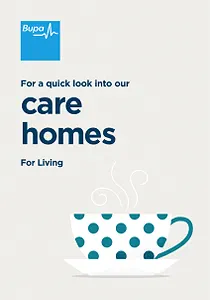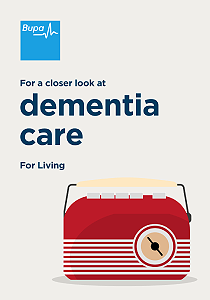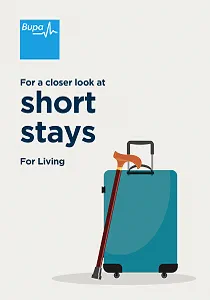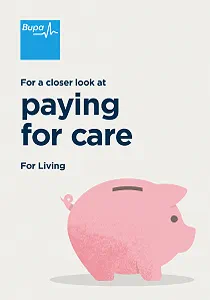Health advice and support for carers
Life as a carer
Graeme Sutherland shares his experience of providing care for his mum and how it affected his mental health. Graeme addresses feeling responsible and being unprepared, and how life in a care home has been a positive for them both.
Transcript
Who are you?
My name is Graeme and I work online, sharing my life
with my mum who has Alzheimer's, and she got that at 59.
And I educate people, raise awareness,
and show them myself fundraising.
What sort of care did you provide in a typical day?
At the earlier stages, I would lay my mum's clothes out in
the morning for her to put on.
I would prepare her meals like a breakfast or lunch
or dinner, and I would also prepare her medication
to give her, because she was able to do all that on her own
if she was prompted. At the later stages, we required carers
to come in and they would do the more difficult tasks like
personal care because that became a bit too much for me
and they then had to get some help giving my mum food
and fluids to make sure she was eating
because she needed more than just being prompted.
She needed someone to actually feed and give her fluids.
I would also take her out walks
and just kind of monitor her in the house just
to make sure everything was okay
because she would get lost sometimes in the house
or a bit agitated,
and I would just always be
around just in case she required my help.
Did you feel pressure or like it was your duty to become a full-time carer for your mum?
There was a little bit of pressure,
but I did feel it was my duty to become a carer for my mum.
She did tell me at the beginning that she didn't want
to put my life on hold
and that we should just continue with our life to leave her,
but it's something I'd never do
and I'd never live with that guilt,
and it's something I wanted to do,
even though I felt it was my duty.
It's something I wanted to give back
because she's cared for me my whole life.
Did you get any outside help with caring for your mum at home?
We eventually got outside help a couple
of years into the diagnosis with carers, helping provide
the necessary care at home.
But we also got help from a charity, Alzheimer Scotland,
who was able to provide us with advice
and to help for us as the carer
and to be able to take mum out for a day
or two a week, which gave us some respite,
which was much needed at the time.
As a young adult, how did being a carer affect your relationships and social life?
It gave me no social life.
I wasn't able to go out with my friends at the time.
I was in my mid twenties, so everyone was
still going out at that point.
Whereas I had a responsibility to be at home to look
after my mum and my friends didn't understand
that. They didn't have those kind
of responsibilities at the time.
It also affected my work.
I wasn't able to progress further.
I had to cut back a bit
and I was always worried at work,
so it was affecting me at work as well,
so you could never switch off.
So it affected everything.
It just put halt and everything,
and I couldn't live life the way people,
my friends were at my age the same.
Did you have to stop working?
I kept working full time because I have a twin
and she worked at night as a nurse,
so when she was working at night, I was always in
and if I was away during the day, she was sometimes there,
so we always overlapped each other.
But at work I would have a camera on my phone just
to check in at home and I could phone her at that time
and put her on speaker just to check up on her.
How did you balance caring with work commitments and your own personal life?
There wasn't much of a balance, I would kind of
use work to cover both.
Work was my almost freedom to get away from everything.
I was at work, even though I'd still check on her via camera
on my phone, I was away from the house.
I was socialising with my colleagues
and they were the people who I built relationships
with at the time and still good friends with today.
So it was an escape for me to go to work.
And when I came back from work, I didn't have a social life.
I couldn't have relationships.
I'd still speak to my friends online, but I couldn't go out.
So I used work to cover both of those side of things.
How did you make time for self-care?
At the beginning, I didn't take any time for self-care.
I had my mum as my priority and she was my focus.
And you kind of forget about your own self-care to begin
with, and it's not until you realise how ill
or tired and run down
and burnt out you feel that's when you need
to take care of yourself.
And to do that, I started going to the gym, started
to go out more walks, and just taking care
of my health in general.
When was your mum initially diagnosed with dementia?
My mum was 59, which was nearly 10 years ago.
I was around 25 when she was diagnosed,
and she was diagnosed at late stage, but early onset,
and this was a couple of years
after my dad,
her husband passed away quite suddenly, within six months.
So she was misdiagnosed with depression for a couple
of years, which was hiding the fact
that she had Alzheimer's,
and that's why it took so long for us to get a diagnosis.
What were the early symptoms of your mum's dementia?
The ones I noticed was a change in personality was a big
one, and it's more obvious now looking back.
Her weight loss as well,
but because we thought she had depression
we thought that was normal.
She was also getting very confused easily.
But again, that's something you always try and dismiss
and you always never go to, that's Alzheimer's.
You try and think of anything else but Alzheimer's
and probably her hygiene
and taking care of her own personal, the way she looked.
She wasn't ironing her clothes,
she was wearing them inside out.
Just wasn't being herself at all.
When did you realise it might be dementia, rather than grief/another condition?
So I noticed when I took my mum to London for her birthday,
we were going to the Harry Potter Studios
and she had strange behaviour like spraying deodrant on her
shoes and clothes she brought with her weren't clean.
And even going to the studios,
she was getting upset over very small tasks, like asking her
to press a button on the camera to take a photo of me.
She couldn't understand that.
And to me, that was ringing alarm bells
because it was going past the stage of depression for me
and that something was a bit more sinister.
And that's when we decided to look into it more.
How have your mum's symptoms developed since diagnosis?
She was diagnosed with early onset, but late stage.
So I only know from the stage we were told.
It's been quite slow for a late stage,
but I'm unfamiliar with what the early stage looks like,
but my mum was hiding
and masking that with my dad's passing
and her depression, so
that could be what that looked like to me.
Early onset is
because she was under the age of 65 at the time,
but her symptoms have just slowly got worse over time.
Her speech, she can no longer speak well at all.
She's nearly nonverbal. Her mobility's nearly gone.
Her eyesight's getting worse
and she requires someone to give her fluids
and give her food,
and she really needs everything done for her
now, she's not independent anymore.
How has your communication with your mum changed over time?
We were just like normal mother and son to begin with.
Then she started to become more quiet, so I had
to start speaking up more.
So I would speak for her
and treat her more of a child than her being my parent.
And she would kind of be very blunt with most
of the things she was saying,
but she would have a laugh with it.
She was never aggressive, which we're quite lucky with.
Through time, her speech has slowly faded away.
She would get her words mixed up quite a lot or sentences,
and that would really agitate her.
But now she makes more of a noise,
which some people might think is her in pain or moaning,
but we can tell it's her trying to communicate to us
because she's nearly fully nonverbal.
She can still say the odd word here
and there, which is quite rare, but means more when
she can say those words.
But now she just tries to communicate with us
as best she can, and we try and make up what she's saying.
But it's just one of these things.
It's almost like speaking to a baby sometimes.
You just have to go with it.
What made you decide it was time to look for a care home?
Me and my sister were both burnt out, working full-time
and caring and having no rest other than the few hours a
week of respite, which wasn't enough at the time.
And my mum was just so upset all the time,
and she was quite scared at home.
So we realised
that she needed more care than we could provide,
and it was more from a selfish point of view that we wanted
to keep her at home rather than she can stay here.
She needed more help, and we decided that it was time
that we started looking for help.
How did you choose the right care home?
So we did our research online.
We had looked up care homes
and whittled it down to around six.
And from there we then visited those six care homes just
to get a good feel of the place and to have a look around
and to ask questions to see which one we liked the best.
And then we found one which was just ideal.
And me and my sister both agreed that we loved that one.
And it was a small one.
And just somewhere that didn't feel like a care home,
it felt more like home.
And that's where we wanted our mum to be,
and that's how we chose that care home.
Have you ever had a family member in a care home before?
No, this was our first time, so I didn't know what
to expect.
What went through your head the moment you dropped your mum off at the care home?
I remember being quite upset,
but thinking, have I made the right decision?
Have I just done this so that I can get on my life?
Is it selfish for me to do this?
Definitely a lot of regret
and second doubt myself.
What emotions did you experience on the drive back home?
I was very upset and felt really lonely
because it's almost like giving into the final
stage of her illness.
I was just devastated.
What did it feel like walking into an empty house for the first time?
When I went back, it was just as if a chapter had closed
and we were moving on to the final chapter, which
is very upsetting
and can be very difficult to cope with at times.
And it's always something that I fall back to.
Everything goes in waves.
I have good and bad days,
and that was probably the beginning off the final chapter
for our family.
Did you have any regret in the first few days?
Me and my sister both felt really guilty
and we were both wanting each other to answer the question
and tell each other that we weren't doing anything wrong.
But we couldn't help but feel we were,
and it just took us to, we had to take our own advice,
but we were giving it to each other,
which made it a lot easier.
But we did have so many doubts for a good couple
of weeks afterwards.
We just felt devastated by it all.
When did you realise you actually made the right decision?
It was more taking her out from the care home
and going on days out together.
I was enjoying myself.
I was making really good memories with mom,
and she was happy, and I could see she was happy
and it was unusual because usually she was happy,
but I wasn't in that moment with her.
Whereas now I was enjoying the moments with her
and creating memories,
and that's when I realised that this was the right decision
for both her and me.
What impact did this experience have on your life?
I think I try
and live my life to the fool compared to what I used to.
It's definitely made me grow up a lot quicker.
I used to be very quiet.
I used to called, I'm mute when I was younger,
but the past 10 years, I've really grown up
and took charge my own life again.
That's probably a silver lining in it
that it gave me other opportunities to help so many people
and raise a lot of funds for other people.
How long has your mum been in the care home now?
She has been in the care home
for just over three years now,
and it feels like we all know each other, both the carers,
the family, and my mom.
We all know each other and it's like an extension
of the family, and it creates a good form of trust, which is
so important when someone's looking after our mom.
So it's been very beneficial
and we just know that she's going to get the best care.
How has life changed for you and your mum since the move into a care home?
Life has improved.
Definitely for myself.
I feel like I've got more of my life back.
I can rest more and look after myself,
and I can also, when I got up to see her,
I feel better and more rest.
I can enjoy time with her now instead of being
so stressed out and overwhelmed all the time.
It wasn't a good, it wasn't good when I was
spending quality time with her.
It's more quality time now. For her
it's also improved because she's getting
the social aspect of it.
She's also got round the clock care
and she never needs to worry
and she enjoys time with her family.
I can take her out now and it's enjoyable for her.
So it's been positive all around both for her health
and my health.
What does a typical day in a care home look like for your mum?
My mum gets woken up in the morning.
She gets her shower, they'll get her dressed,
straighten her hair, and then get her breakfast
sorted with medication.
And then they will usually take her downstairs
and she can mingle with everyone there.
They either have the TV on or they can sit and talk.
They then have their lunch, get the medication in too,
and there's just always people in and out.
So it's not clinical, it's like a home.
It's like visiting them in a home.
I usually go up three to four times a week to see her.
She can come and go as she pleases.
Well, I can take her in
and out so she's not trapped in there.
I think a lot of people think when they're in a care home,
it's almost like a prison when it's not.
And then she'll get her dinner, which is all made,
especially for Alzheimer's.
Getting the food and meat in,
and usually have an entertainer in
or someone to come in and play games.
And sometimes the school kids come
up to come and see them as well.
So there's always something going on in the care home
to keep them occupied and always somebody visiting.
And if not, there's plenty for them to do.
And it's a social aspect of it, which is really important,
especially for Alzheimer's.
So they're not isolated, sitting in a room.
They have the choice. It's almost like they're living
at a flat at university and they're sharing it with people.
What things does your mum enjoy most about life in a care home?
I think she likes the entertainers come in.
My mum loves music and loves just being entertained now.
Usually it's me singing to her when I go up and visit,
but when a professional comes in, she loves to just sit
and listen to the music, especially the old music
that they play for them,
and she really likes the food in there.
She's a good eater, which is really great,
and the food that they make, the chefs there are excellent
and always knows how to finish all the meals off
with something sweet because she loves her sweets
and she has a bit of cake, so she loves it there.
How has your caring responsibilities affected your own mental and physical health?
At the beginning, it really affected my health.
I was just so burnt out, just so run down that
I just was constantly tired
and I didn't realise I needed to speak to someone.
And that's what I've been doing now.
I speak to people about it. I'm very open about it.
I take medication to give myself a helping hand
because you can't just take that and expect it to work.
You need to actively help yourself as well as
that which I do, I go to the gym, I go out walks,
and even spending quality time with my mum helps me.
If she's happy, I'm happy.
And I've learned that the hard way.
I think people don't realise
because you're so focused on that person, that you need
to take care of your own health
and how can you care for that person if you're not well?
And that's what I didn't realise at the time,
which I realise now looking back.
Did you experience a sense of guilt when your mum moved in into a care home?
I thought that I would feel guilty
when we put her in the care home,
but I felt more guilty than I thought I would.
I couldn't leave to begin with.
We were visiting every single day
because we just felt so guilty.
It was just the guilt consumes you.
And I think that had a really bad effect on my mental health
at the time because of the guilt.
I couldn't really cope with it either.
You would think it would get easier,
but it took about six months for us to kind of trust
that she was fine, because no one can care better
for your mum than you.
And that's the way we looked at it.
But once we trusted them, the guilt faded
and it's something that still stuck with me now.
I still feel guilty when I leave her,
but it's not as intense as it was.
But it affected me that way when we first had her there.
Especially when she has bad days, it is really difficult
to leave, and I think people really need
to realise that that's normal.
That's normal to have, especially if you cared for them.
It's normal to feel that guilt, but they're safe
and they will be happy eventually.
How might the mental health of a carer affect the care they are able to provide?
I think if your mental health isn't good, that is going
to reflect on the care you provide.
I know from my own experience, if I was really tired
or really burnt out and just stressed in general, I would
be quite short with my mum
and have less patience with her,
which is something you really need with Alzheimer's,
you need patience, and I had noticed that I would kind
of almost take it out, not on her, but the disease.
I'd be angry that she didn't know the questions or
didn't know the answers when I just wanted her to know.
And because I was so stressed
and burnt out, I was always just being quite short
and just wanted to sleep all the time.
And it affects the quality of care
that you give for that person
I would say, it definitely reflects on that.
Do you think it's harder for men to talk about mental health?
I think it's much harder for men than it is
for women personally, just
because men are seen as tougher
and it's almost not cool to share how you feel
with your friends, especially male friends.
It's easier with a girl or a female.
I feel like for men, it's just one of those things
that you never find the right moment to discuss it,
and when you do it, it's quite awkward.
I don't know if that's just a personal viewpoint in
that from experience, but from speaking to many people
and seeing it, men have just usually got this
stiff upper lip,
and I think that's why it's more difficult for men.
Were there any times you should have asked for help but didn't?
I would say near the earlier stages, the first couple
of years, I thought that I was able to just cope
with it on my own.
It didn't help when I used to look online for
how long each stage would last, which
would give grim results, so I was kind
of making myself worse
and instead of reaching out for help,
I was just sleeping away, getting up, working, coming back,
and just living in this constant cycle.
I should have reached out then for help.
I should have reached out and spoken to someone,
and I don't know why I didn't now looking back,
but it was just easier to keep on moving at the time.
Did you ever use any respite services as part of managing mental health?
We used respite for my mental health and for my mum.
And we used the charity, Alzheimer's Scotland,
and they would come a couple of times a week
and a coach just to pick mum up from the door
and take her away for about four to five hours,
and they would give her her lunch, socialise,
and it would give me those four to five hours to either do
what I need to do, go shopping
or sleep, which I needed,
which means I could have slept without worrying.
And even those four, five hours don't sound a lot,
but they mean a lot in that time.
It makes a huge difference. It gives you time to relax.
But other than that, we didn't really look into more respite
at the time, which we probably should have.
What support systems did you have in place and how important have they been?
We had, again, the help of Alzheimer Scotland.
They had a phone line
if we needed to speak to someone,
they offered counselling if we required that.
We also had, me
and my twin sister had each other,
so we were always bouncing off each other,
even though we butted heads sometimes.
We both knew we were going through,
and if we did, it was just due to stress.
So we would try and do as much
as we could to help each other.
So I think personally, I couldn't have done it without her,
and I hope she feels the same about me.
But we also had our own friends as well,
who were very supportive through it all,
even though they didn't understand fully the concept of
what Alzheimer's was, was and what we did as carers.
They were always there if we needed just to talk.
Did you ever worry that you might not be doing enough?
Yeah, all the time,
especially when it comes down to personal care.
There have been times where there was no choice that I had
to do personal care, which is something nobody wants to do
for their mum, but it's just something you always worry
about and sometimes you need to
do things you don't want to do.
For the sake of my mum, she needed someone and I was there,
but I did always worry I wasn't doing enough
because you always feel that you can do more.
You always want to do more to help them,
to make them happier, but I think that's just something
that comes with caring.
What advice would you give to someone in a similar position to you?
Looking back, I think education is key to deal with it.
If you know more about the disease, you'll know how
to deal with it more.
And I think patience is a huge thing as well.
Especially for me. I had no patience at the beginning
and I was constantly angry at the disease and not my mum,
but she didn't know that.
And it sometimes causes more problems.
So you need to learn to have patience
because it does get worse as the stages go on.
And as for being a child to my mum, I think
making memories and keeping those happy times is something
that's so important because the whole experience isn't
all doing gloom.
There is still happy times,
and I still have great times with my mum.
Advice for looking after yourself as a carer

Looking after your mental health: a guide
Our guide to looking after your thoughts, feelings and emotions. As well as how to tell if something is wrong.
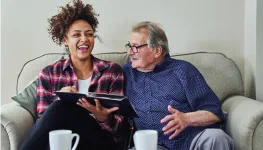
Tips for taking care of yourself as a young carer
Providing care for older relatives is increasingly common. Here’s how you can do it while maintaining your own mental health.
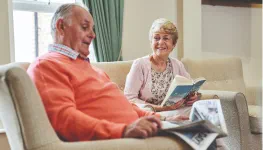
Ways to look after yourself as a carer
Follow our six self-care tips to look after yourself while caring for someone else at the same time.

How to look after someone with dementia (and stay healthy too)
Practical ways you can support someone with dementia while protecting yourself from burnout.
Further help with dementia
Guidance on caring for someone with dementia, information on what symptoms to look our for and a detailed comparison of the different types.
Thinking about care for a loved one?
You don’t have to do it alone. With a range of care options to choose from, we can help you make a decision that’s right for you.
Our customer care team are here for you
Our helpful, understanding care advisers offer free advice on anything from funding to finding just the right home. Call a customer care adviser on:
0333 920 5178^
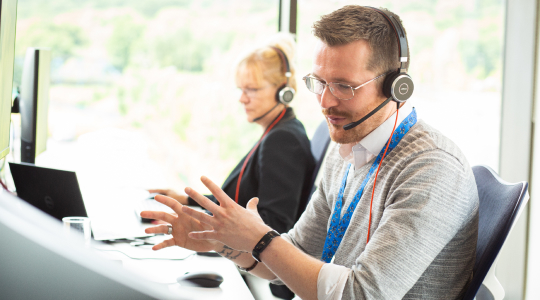
Help choosing a care home
Choosing a care home can be stressful, especially if you've never done it before. We’re here to help you from the start.
Where do I start?
Use our step-by-step guide to help you through the process of choosing the right care home. Starting with finding out which type of care you need, through to arranging visits and assessments.
life in a care home
find out what life is like in a bupa care home, and how exercise and social interaction are being used to combat loneliness.
Care advice
We can answer your questions on providing care. Whether you need a care home or advice on looking after someone at home.
Types of care
Our care homes cater for a range of needs, either on a short or long-term basis. Find out which type of care best suits your needs.
^We may record or monitor our calls. Lines are open 8am to 6.30pm Monday to Friday, 9am to 12.30pm Saturday. Closed Sundays and bank holidays. Calls are charged at no more than local rate and count towards any inclusive minutes from mobiles.


